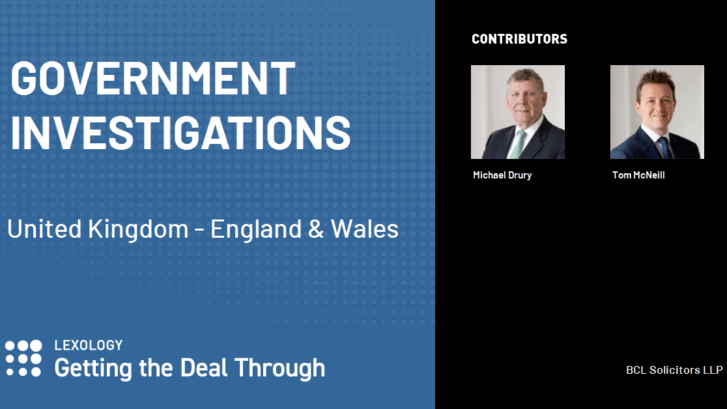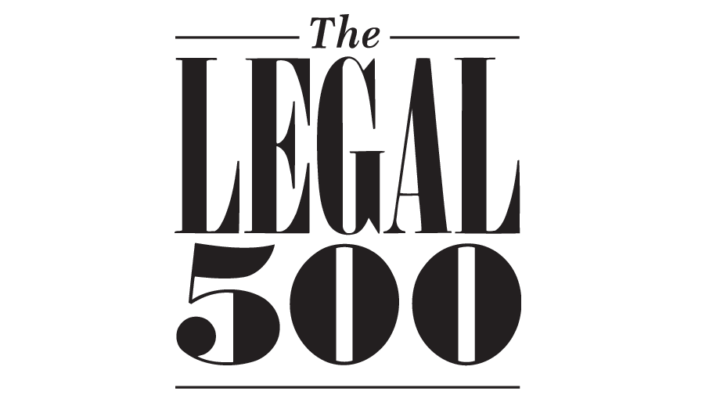BCL partners Michael Drury and Tom McNeill author the England & Wales chapter of Lexology’s Getting The Deal Through – Government Investigations: Global Overview exploring the mechanisms that are available to resolve a government investigation.
Getting the Deal Through provides international expert analysis in key areas of law, practice and regulation for corporate counsel, cross-border legal practitioners, and company directors and officers.
Below is a short extract from the England & Wales chapter*, which you can read in full on the Lexology website or download the pdf here.
ENFORCEMENT AGENCIES AND CORPORATE LIABILITY
Government agencies
What government agencies are principally responsible for the enforcement of civil and criminal laws and regulations applicable to businesses?
The agencies primarily responsible for the enforcement of civil and criminal laws and regulations applicable to businesses are as follows:
- the Serious Fraud Office (SFO);
- the Financial Conduct Authority (FCA);
- the Competition and Markets Authority (CMA);
- His Majesty’s Revenue & Customs (HMRC);
- the Insolvency Service, which is an executive agency of the Department for Business, Energy and Industrial Strategy; and
- the Crown Prosecution Service (CPS), which is the principal prosecuting agency in England and
Wales.
There are also other agencies with responsibilities outside the central areas of financial crime (fraud, bribery and corruption, money laundering, market abuse, etc) where there may be large-scale corporate investigations, including in relation to the environment, health and safety and other ‘regulatory’ areas where similar issues arise.
Scope of agency authority
What is the scope of each agency’s enforcement authority? Can the agencies pursue actions against corporate employees as well as the company itself? Do they typically do this?
The scope of enforcement authority of the relevant ‘government agencies’ is determined by statutory provisions and memoranda of understanding between them. Generally, the CPS, supported by police investigators, will prosecute criminal offences committed by individuals and companies not prosecuted by other specialist agencies. It also prosecutes offences of tax fraud investigated by HMRC, if HMRC officers consider it necessary and appropriate to use criminal enforcement rather than using their civil enforcement powers for those offences.
The SFO is a specialist agency that investigates and, if appropriate, prosecutes both individuals and companies that commit serious or complex fraud, bribery and corruption, even where there is no corresponding regulatory offence. It also uses civil enforcement in relation to asset freezing and the recovery of the proceeds of crime.
The FCA is primarily a financial services regulator. It uses a wide range of rule-making, investigative and enforcement powers (criminal, civil and regulatory) to regulate and take action against businesses and approved individuals that breach FCA principles and rules that are designed to meet its operational objective to protect consumers, protect and enhance the integrity of the UK financial system, and promote healthy and effective competition between financial services firms in the interests of consumers. It has become the de facto prosecutor for insider dealing.
The CMA has a regulatory and enforcement function to promote competition and consumer law compliance. It investigates mergers that could restrict competition; conducts investigations into markets where there may be competition problems; investigates suspected breaches of UK and EU competition law; and enforces consumer- protection legislation to tackle market conditions making it difficult for consumers to exercise choice. The CMA has joint responsibility with the SFO for investigating and prosecuting cartel offences. The law in relation to criminal cartel offences does not require proof of dishonesty.
HMRC is responsible for the collection and regulation of taxes and customs or duties, and the investigation of serious and organised fiscal crime, in particular offences committed under the Customs Excise and Management Act and ancillary matters such as export control. It has both criminal and civil investigatory and enforcement powers and, unusually, has the discretion outside the court’s jurisdiction to resolve suspected criminality by way of a civil settlement. They are able to do so either under the Contractual Disclosure Facility (CDF) pursuant to Code of Practice 9 (in relation to any suspected tax offence) or by entering into a compound settlement with the taxpayer in respect of certain offences (a process known as ‘compounding’). Both processes involve the payment of a penalty in lieu of potential prosecution, in addition to the payment of any outstanding tax and interest.
The Insolvency Service deals with corporate misconduct through its investigation and prosecution of companies for breaches of insolvency legislation on behalf of the Department for Business, Energy and Industrial Strategy. It has civil enforcement powers, including the power to conduct confidential investigations into serious corporate abuse in relation to limited companies and limited liability partnerships.
Each of these agencies can pursue enforcement against both corporates and individuals. The majority of financial crime offences require a mental element (generally dishonesty) to be proved to achieve a conviction. Ordinarily, a company can only be convicted of an offence requiring a mental element through the ‘identification doctrine’. The prosecution must first establish that an individual who was a ‘directing mind and will’ of the company (ie, a senior individual who could be said to embody the company through his or her actions and decisions – usually a director) committed acts amounting to a criminal offence and had the criminal intent to commit those acts. The individual’s guilt is then attributed to the company. An exception to offences requiring a mental element – and a prosecution that can only be brought against a company – is an offence under section 7 of the Bribery Act 2010 . This prescribes that a corporate can be prosecuted for failure to prevent bribery. Similarly, there are the more recently enacted offences of failure to prevent the facilitation of tax evasion pursuant to sections 45 and 46 of the Criminal Finances Act 2017 . These are strict liability offences, subject to a defence of having ‘adequate’ (or ‘reasonable’) procedures to prevent the offending.
At the time of writing (May 2023), a proposed new failure to prevent fraud offence has been included in the Economic Crime and Corporate Transparency Bill, which is currently working its way through the UK Parliament. This proposed new offence broadly follows the same model as the bribery and facilitation of tax evasion offences, namely strict liability subject to a reasonable procedures defence (currently, the offence is only intended to apply to ‘large’ organisations). The government also has plans to reform the ‘identification doctrine’ so that it applies more widely to ‘senior management’; however, there are as yet no detailed provisions on this proposed reform.
Guidance on corporate prosecutions has been issued by the prosecuting agencies, such as that of the CPS , and applies to all prosecutors, including the SFO. Generally, the guidance provides that a company should not be treated differently from an individual. However, the prosecution of a company should not be seen as a substitute for the prosecution of criminally culpable individuals. In all cases, sufficient evidence is required and public interest factors must be considered and met to justify the prosecution of both individuals and companies. Examples of factors tending against prosecution of companies include the availability of civil or regulatory remedies that are likely to be effective and proportionate, and evidence of a genuinely proactive approach having been adopted by the company when offending is brought to its attention, such as self-reporting and remedial actions, including the compensation of victims. In the case of corporates (but not individuals), a deferred prosecution agreement is available and in its use by the SFO has become a ‘normal’ outcome of investigations.
* Reproduced with permission from Law Business Research Ltd. This article was first published in Lexology GTDT – Government Investigations 2024. For further information, please visit: https://www.lexology.com/gtdt
Please note that you will need a subscription with Lexology to access the guide.




